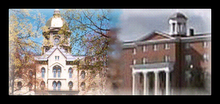This year's "Catholic" author is none other than the Bard himself, the great William Shakespeare!
Tonight's lecture was delivered by Prof Joseph Pearce of Ave Maria University.
He has recently finished writing a book on the topic of Shakespeare's Catholicity which should becoming out within a year or so. I'm really looking forward to it because while I've heard bits and pieces regarding the Catholicity of the Bard, I've never heard an argument quite as persuasive as the one I heard tonight.
Pearce addressed 3 questions:
-Is Shakespeare the man important?
-Is Shakespeare Shakespeare?
-Was Shakespeare Catholic?
To the first question Pearce replied "of course!" He quoted Shelley and Tolkien among others explaining that the relationship of the author to the work, the mystery of creativity, is very important. The centrality of personhood in the process of writing cannot be ignored. It is crucial that we understand the person if we are to understand the work.
To the second, Pearce blasted away a number of theories that claim Shakespeare was merely the nom de plume of some aristocrat. Wonderful stuff - but I'll let you read it when the book comes out.
In response to the third, Pearce called upon history to explain the Catholic-Protestant tension of Shakespeare's day. He traced the Spiritual Will & Testament of Shakespeare's father to St Charles Borromeo and then back up to the Jesuits that Shakespeare would have known. Pearce explained its very difficult to claim that Shakespeare was not born Catholic - and it's nearly as difficult to claim he didn't die Catholic. So what did he do in between? Again, Pearce cited a number of records, sources and other Catholics favored by the queen because of their work (eg William Byrd - who Mass for 5 voices I'm listening to now!).
A very good case all in all!
The lecture was recorded, so I suppose it will be up on the CEC website in a bit. The book will come out sooner or later and you can read all the details there.
In the meantime, I leave with the above teaser to Pearce's work as well as the following sonnet read before the lecture.
Sonnet 73
| That time of year thou mayst in me behold |
| When yellow leaves, or none, or few, do hang |
| Upon those boughs which shake against the cold, |
| Bare ruin'd choirs, where late the sweet birds sang.* |
| In me thou seest the twilight of such day |
| As after sunset fadeth in the west, |
| Which by and by black night doth take away, |
| Death's second self, that seals up all in rest. |
| In me thou see'st the glowing of such fire |
| That on the ashes of his youth doth lie, |
| As the death-bed whereon it must expire |
| Consumed with that which it was nourish'd by. |
| This thou perceivest, which makes thy love more strong, |
| To love that well which thou must leave ere long. |
*The churches destroyed in Shakespeare's time by the Protestant government. The sweet birds, the monks that used to chant there.









No comments:
Post a Comment